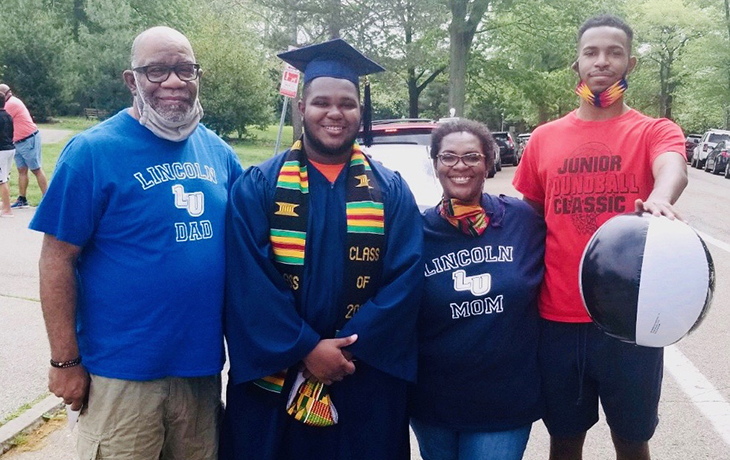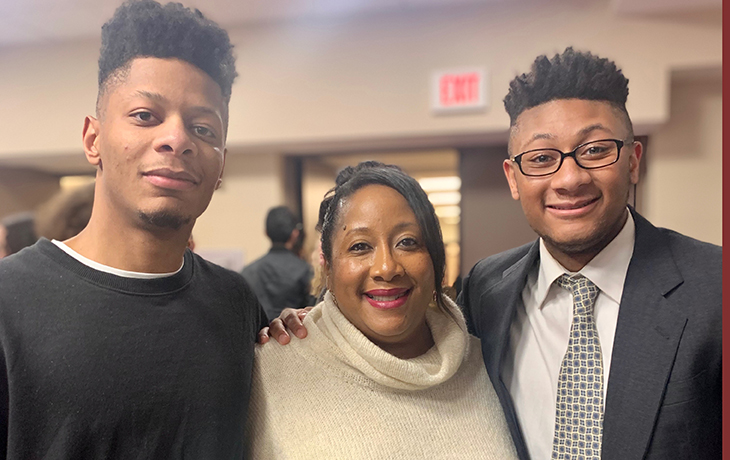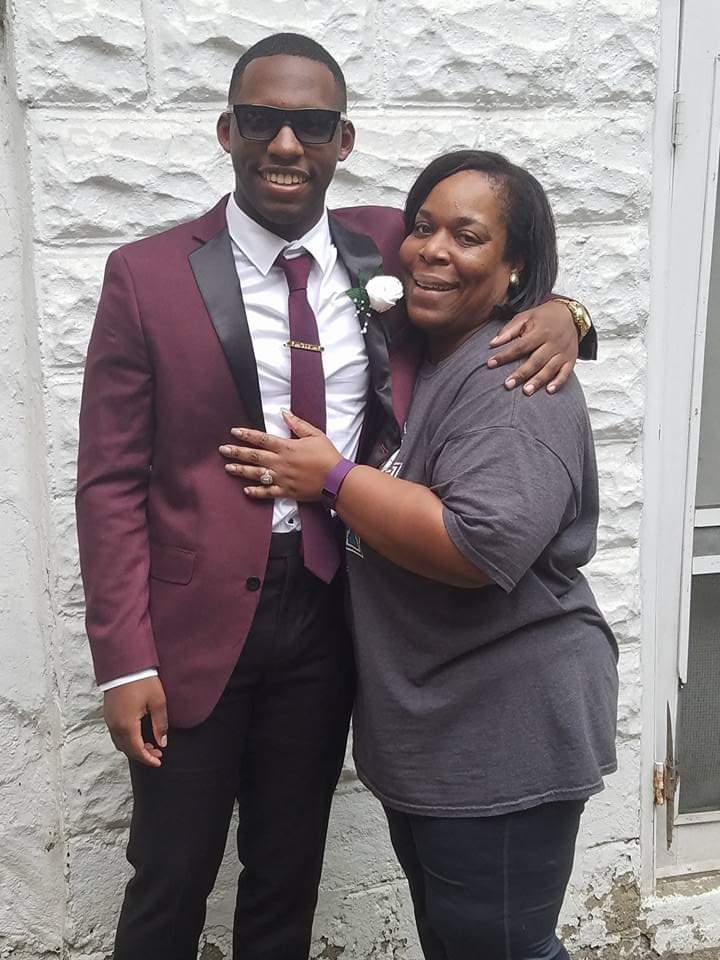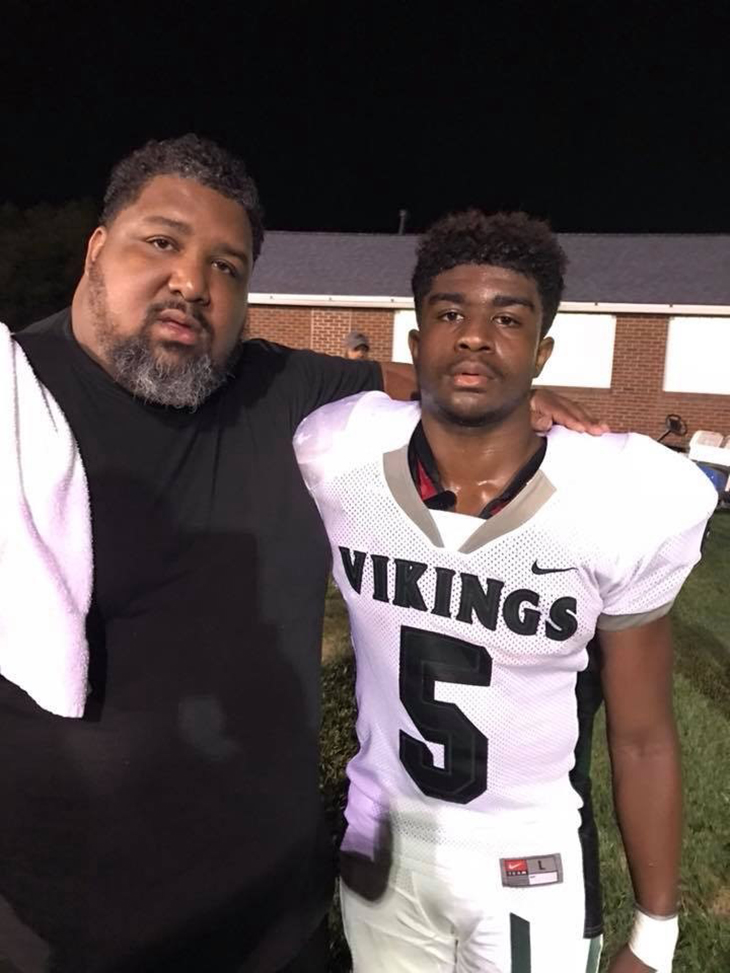As George Floyd and others have died in police custody, African American parents’ concerns for their children’s interactions with police are heightened
by Merecedes J. Williams and Renee P. Aldrich
For New Pittsburgh Courier
The most fearful weapon Black men possess is the color of their skin.
As protestors have poured out into streets across America and the world to fight the executions of those like George Floyd and Ahmaud Arbery, Black parents are terrified now more than ever for their Black sons.
Coronavirus, teleworking, and school closures are on the backburner as Pittsburgh’s Black parents are concerned about their children’s interactions with law enforcement.
As we’ve all recently witnessed, it is a matter of life and death.

THE MOSES FAMILY—Darnell, Thurgood, Kim and Langston. If his sons are ever stopped by the police, Darnell reminds them to “remain calm and be compliant—the goal is always to get back home safely. We’ll take up any problems after you get home.”
It was about a month ago—17-year-old Thurgood Moses, his brother, 16-year-old Langston Moses, and their father, Darnell Moses, were in a vehicle that Darnell was driving in Green Tree, a Pittsburgh suburb.
That’s when a police car came up behind them and pulled them over.
According to the Moses family members in the vehicle, the officer said he pulled them over because a tail light was out. The stop went smoothly, they said, as dad was able to demonstrate what he teaches his boys to do. But, in an interview with the New Pittsburgh Courier, Darnell said: “I’m sure we were stopped just for the heck of examining a car with three Black men in it in Green Tree. We did our due diligence, and it was one of the better outcomes.”
Unfortunately, when the Minneapolis police were called to a relatively minor situation on May 25 where a Black man, 46-year-old George Floyd, was accused of passing a counterfeit bill, the outcome wasn’t how it was for the Moses family. As the world has seen, former officer Derek Chauvin somehow found it as proper protocol to pin Floyd to the pavement via Chauvin’s knee on Floyd’s neck—for nearly nine minutes.
Floyd was laid to rest in his longtime hometown of Houston, Tex., on June 9.
Add to that the vigilantes, as the McMichaels believed they were earlier this year, as father (Gregory) and son (Travis) chased down a jogging Arbery, a 25-year-old Black man from Georgia, and the son eventually shooting Arbery dead with a shotgun.
Prior to them, there were others, unarmed Black men who were found dead at the hands of police, like Eric Garner, Tamir Rice, and who in the Pittsburgh area can forget about Antwon Rose II—shot three times as the 17-year-old ran away from the East Pittsburgh police on that fateful day, June 19, 2018.
And for many seasoned Pittsburghers, they remember where they were in 1995 when Johnny Gammage, a Black motorist driving a Jaguar in the Pittsburgh suburb of Brentwood, was stopped by police and later died via suffocation caused by pressure on his back and neck during the arrest by police. Gammage, again, like so many other Black men, was unarmed.
In addition to the Moses family, the New Pittsburgh Courier spoke with multiple Pittsburgh-area Black mothers and fathers who have sons, and thus, have fear. You hope for the best, but in the back of your mind, you just never know what will happen if your son gets confronted by the police.
The fears of Darnell and Kim Moses, the parents of the aforementioned Thurgood and Langston, are centered around the fact that the two sons already look like grown men. They’re tall, with broad shoulders and facial hair. “They have looked older for quite a while,” Kim told the Courier, “and we have been intentional in letting them know that in hanging out with their friends, many of whom are White and considerably smaller, they need to remember that they will not be able to do what their White counterparts can do, even down to having on the proper gear when biking—(which includes) wearing a helmet. We made sure they knew to never give the police a reason to have to question you—as unfair as that seems—you must work to not bring additional attention to yourselves. It is just the reality of the world we live in.”
As for Darnell, the father: “When we learned that Langston traveled with his White friends in places like (Pittsburgh neighborhoods) Highland Park and Shadyside, we took him aside and got into that conversation; helping him to understanding that as he is a Black teen, in general, if the police have to make a decision about him or his White friends—most likely it won’t be in his favor.”
Both of the Moses sons have gotten driver’s licenses and the driving experience opens an entirely different form of discussion. “We keep the insurance card and registration in a lanyard, hanging from the rear view mirror,” Darnell said. “When they are driving, I encourage them to place their license in there as well.
Additional instructions include keeping their hands on the steering wheel and rolling down all the windows (if stopped by the police). They should remain calm and be compliant—the goal is always to get back home safely. We’ll take up any problems after you get home.”
The potential for a Black son’s untimely death at the hands of the police weighs heavily on the hearts and minds of Akia Wiliams, 40, of the Hill District, Gina Mitchell, 50, of Forest Hills, and Lisa Perry, 52, of Aspinwall. Sometimes, it feels like Black boys and men are on the endangered species list.
Williams has two sons—9-year-old Rishani and 20-year-old Amaru. Amaru, a graduate of CAPA High School, has been active in local theater since he was 13.
“I began having the ‘what to do if you have an encounter with the cops’ conversation with Amaru when he was 8 or 9,” Williams told the Courier. “At that time, we were living in Wilkinsburg—and it felt commonplace for hyper-vigilant officers to watch for perceived criminal activity. To me this meant his chances of being targeted or approached negatively were doubled—even though he was still quite young. At that time, he did not see himself more ‘different’ than anyone else—he didn’t quite get the importance of the conversation. By the time he was 15/16 he did begin to understand, and began listening to his mother, clearly beginning to see the differences between he and his White peers.”
Williams said her fears “often flared up during the theater season. He often found himself in many neighborhoods including Polish Hill, the North Side to meet his aunt, Swissvale and Penn Hills, hanging with friends. I knew I couldn’t be with him 24 hours a day. The conversations were ongoing efforts to get him home alive. My two greatest fears were around mistaken identity on the part of the cops—it seems to them one Black man or teen is just like the other, and they tend to approach with aggression first, and ask questions later.”
The other big fear for Williams is having any of her sons being roughed up by the police.

LISA PERRY is the mother of Justice Perry, left, and Xavier Perry. She made sure that police in Aspinwall knew her sons were residents of the community. “It was the only way I could show them (the police) that we are here and we are not a threat,” Perry said.
Perry never gave her children a false sense of security, living in the quiet borough called Aspinwall, a mostly-White area, near Fox Chapel, another mostly-White area. “We never lost sight that as Black men, they are still subject to being targeted by the police,” Perry told the Courier. “Though the police here (in Aspinwall) are community-oriented,” she said she would introduce the police to her children (Morgan Perry, Justice Perry, Xavier Perry) at National Light Up Night events. “It was the only way I could show them (the police) that we are here and we are not a threat,” Lisa Perry said.
According to the U.S. Census, Aspinwall, which most locals know as the community you travel through right before Waterworks Mall, has about 3,000 residents. The census states that the Black population is zero percent. Of course, that’s not factually correct; there are a few African Americans that call Aspinwall home. A few.
“I knew from the gate that fostering some kind of relationship with the police would go a long way in creating a safer landscape for my children,” Perry told the Courier in an exclusive interview. “I felt compelled to let them know who we are, what street we live on, and that my expectation is that my sons would be kept safe, also. That way, if we have to call them, they may recognize we live in this community, and at the same time, if there is ever a need to approach one of my sons, they may recall I took the time to let them know who we are.”
Perry said she let the police know that her eldest son, Justice, a Duquesne University graduate, has a developmental disorder called Asperger’s, and it could hinder Justice’s ability to properly respond to certain police commands.

GINA MITCHELL, with son, Anthony Bryson Perkins.
Gina Mitchell, 50, and her son, Anthony Bryson Perkins, enjoy an extremely close relationship. He’s 21, a Woodland Hills High School graduate, and was an aspiring football player. However, a torn ACL (Anterior Cruciate Ligament) in his knee halted his football-playing dreams. “Over the years I was always his transportation, reducing the risk of any police encounters. We lived first in Uptown before moving to Forest Hills, and we always had the conversations right away,” Mitchell said. “I told him the cold hard truth that there were ways he had to conduct himself in any encounter with the police so that he could make it home safely every night.”
What are Mitchell’s exact words to her son that she constantly preaches? “Whatever happens, do not run, do not resist.” She said that police expect Black men to resist and run. “Always say to yourself, ‘I just want to return home tonight—I want to still be standing.”
It would be unfair to paint a broad brush and say that all police officers are bad, or racist, or treat Black people differently than they treat White people. Countless officers across Pittsburgh and the country are credited with saving lives, being a mentor, and being deeply entrenched in community service projects.
Officers were seen during numerous protests in this country walking side-by-side with protesters, and even taking a knee with protesters. Taking a knee is what Pittsburgh Police Chief Scott Schubert said felt “right” when he did so this past weekend during a protest in the Pittsburgh neighborhood of Beechview. The chief went on the record recently to state that “excessive force” is “unacceptable” and “will not be tolerated at any level” in the Pittsburgh police force.
Still, ask most Black people in Pittsburgh and the surrounding areas, and the relationship between African Americans and the police would be best described as, “a work in progress.” There is a fine line in constant motion between trust and distrust, like and dislike, when it comes to Blacks and the Boys in Blue.
Residents are still steaming in Louisville, Kentucky, as undercover police detectives stormed a residence there on March 13, looking for a suspect and drugs. A Black man and his girlfriend, Breonna Taylor, were inside the home, and the man, thinking that intruders were breaking in, fired his weapon. Officers returned fire, striking Taylor, 26, eight times, killing her.
Turns out, the suspected drug dealer that the police were looking for had already been apprehended 10 miles away by another set of police.
Simply put, Taylor should be alive today.
“We were able to see what happened to George Floyd,” said Lonita Baker, a lawyer for Taylor’s family, to the Los Angeles Times. “We have to tell what happened to Breonna.”

ANTHONY HALL AND BRENNAN HARRIS
Back at home, Anthony Hall, 38, of McKees Rocks, is the father of two Black sons, and he is most afraid that one day he will receive that devastating call. “It is my biggest fear that I will lose my sons to some remnants of gun violence or police brutality.”
Brennan Harris is Anthony Hall’s son. Hall describes Brennan, his oldest son, as a “gentle giant,” the same moniker that George Floyd was referred to by many. Brennan is headed to Indiana University of Pennsylvania in the fall to play football. But his father knows that because of the color of his skin and athletic size, Brennan could make “one small mistake that can change or end his life.”
With Brennan heading to college, Anthony Hall wants his son to remember the things he has taught him about interacting with the police. “I want to make sure he keeps his hands visible or showing on the dashboard with no sudden movements and I implore him that he adheres to the same rules even when he’s not with me.”
Hall continued: “His size and skin color, which is something he can’t turn off, poses a threat to society and the thought process of police officers on how they approach Black men.”
Carlos Jay, 18, of Garfield, has a routine when he is operating a vehicle. Before he does anything, he puts his wallet on the dashboard, so that just in case he’s pulled over, his information is in plain sight.
“A piece of me broke inside knowing he doesn’t want to reach for anything,” said Carlos’ mother, Cherise Daniels.
Daniels has always taught her son to be “careful, cautious and to think before he speaks.” But she continues to feel broken every time her son takes those necessary precautions in fear of having an encounter with the police.
“It’s heartbreaking to know he feels that as a Black man, he can’t even ‘reach.’ When it should be a normal ability to do so.”
Especially during these times, Daniels feels it is important for Carlos to know his rights. “I told him, ‘we need to learn our rights.’ So, if he ever gets pulled over by an officer, he knows his rights.”
Carlos, who loves playing football and shined as a defensive tackle for the USO (Pittsburgh University Prep, Sci-Tech, Obama) football team, is 6’7” and weighs 280 pounds. Daniels is worried about her son and his stature posing another threat to police.
“Every second he’s out of my sight, I am concerned about his safety. He’s an easy target because not only is he Black but he is big and tall,” Daniels told the Courier in an exclusive interview. “So, what? Does that make him intimidating enough for an officer to abuse their authority? I pray for my son without ceasing. I am believing and trusting God to keep my son in the midst of it all.”

IVA FREEMAN, with son, Keeshawn.
Iva Freeman, 42, of East Hills, knows that all police aren’t bad. She constantly reminds her 21-year-old son, Keeshawn, of that very fact. “There are Black cops that have sons that look just like mine,” she said.
Shortly after graduating from Pittsburgh Allderdice High School, Keeshawn joined the workforce and immediately took pride in purchasing his first car. As a result, “Driving While Black” is in effect, and that forces extra precautions to be made. “We inspect his car daily to make sure his lights work, tags are in place, his driver’s license is on him, and his proof of insurance and registration is in in the car and a copy is on his phone,” Freeman said.
Freeman also encourages Keeshawn to never get out of the car and call her as soon as he’s pulled over. “If he is on foot, never run, remain calm and comply.”
She fears that one day, “he is going to fit the profile of whatever the police are looking for and kill my son.”